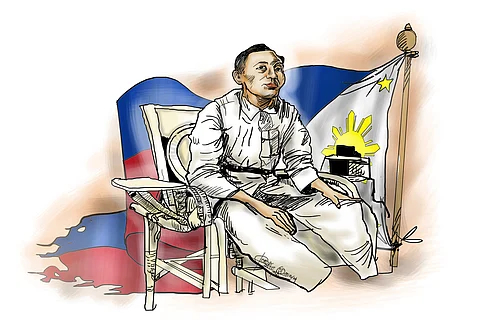
- NEWS
- the EDIT
- COMMENTARY
- BUSINESS
- LIFE
- SHOW
- ACTION
- GLOBAL GOALS
- SNAPS
- DYARYO TIRADA
- MORE

Apolinario Mabini, often referred to as the “Brains of the Revolution” and the “Great Plebeian,” stands as one of the Philippines’ most revered heroes.
Last Tuesday, 23 July, a day before “Carina” and the monsoon rains struck with impunity, the nation commemorated his greatness, reflecting on his invaluable contributions to the struggle for independence and the formation of the Philippine Republic.
Mabini’s life and legacy offer profound lessons in resilience, intellect, and patriotism, making him a figure of enduring significance in Philippine history, particularly amid the present-day tensions in the West Philippine Sea.
Born on 23 July 1864, in Tanauan, Batangas, Apolinario Mabini rose from humble beginnings to become a pivotal figure in the Philippine Revolution against Spanish colonial rule.
Despite facing numerous hardships, including poverty and a crippling illness, Mabini’s indomitable spirit and sharp intellect propelled him to prominence. He earned a law degree from the University of Santo Tomas, a testament to his perseverance and dedication to education.
Mabini’s greatest contributions came during the latter part of the 19th century, as the Philippines grappled with the twin challenges of Spanish oppression and the quest for self-governance.
His intellectual prowess and unwavering commitment to the revolutionary cause earned him the moniker “Brains of the Revolution.” As an adviser to Emilio Aguinaldo, the leader of the revolution, Mabini played a crucial role in shaping the strategies and policies that would guide the movement.
One of Mabini’s most significant achievements was his authorship of the 1898 Constitution of the First Philippine Republic, also known as the Malolos Constitution.
This landmark document laid the foundation for the establishment of an independent Philippine government, enshrining principles of democracy, equality, and human rights.
Mabini’s vision for a sovereign nation, governed by the rule of law and the will of the people, was a beacon of hope for Filipinos yearning for freedom. His influence extended beyond his legal and political contributions.
His writings, particularly “The True Decalogue” and “The Constitutional Program of the Philippine Republic,” articulated a philosophy of governance and morality that resonated deeply with the Filipino people.
He emphasized the importance of ethical leadership, civic duty, and national unity, principles that remain relevant to this day. Mabini’s intellectual legacy continues to inspire generations of Filipinos to strive for a just and equitable society.
Despite his immense contributions, Mabini’s life was marked by personal trials and tribulations. In 1896, he contracted polio, which left him paralyzed from the waist down. However, his physical limitations did not deter his resolve.
Mabini continued to work tirelessly for the revolutionary cause, writing, advising, and strategizing from his sickbed. His resilience in the face of adversity exemplifies the strength of the human spirit and the power of intellect and determination.
Mabini’s unwavering patriotism and moral integrity also set him apart as a leader. In the aftermath of the Spanish-American War, when the Philippines found itself under American colonial rule, Mabini remained steadfast in his opposition to foreign domination.
He was arrested and exiled to Guam in 1901 for refusing to pledge allegiance to the United States. Even in exile, Mabini’s commitment to the cause of Philippine independence never wavered.
His writings from this period reflect a deep sense of national pride and an unyielding belief in the Filipino people’s right to self-determination.
The commemoration of Apolinario Mabini’s life and legacy on 23 July serves as a reminder of the enduring values he championed. His contributions to the Philippine Revolution, his vision for an independent and democratic nation, and his unwavering dedication to the principles of justice and equality make him a towering figure in Philippine history.
Mabini’s life story is a testament to the power of intellect, the strength of character, and the resilience of the human spirit.
As the Philippines commemorates his greatness, it is a fitting tribute to a man whose life and legacy continue to inspire and guide the Filipino people in their pursuit of a better future.
